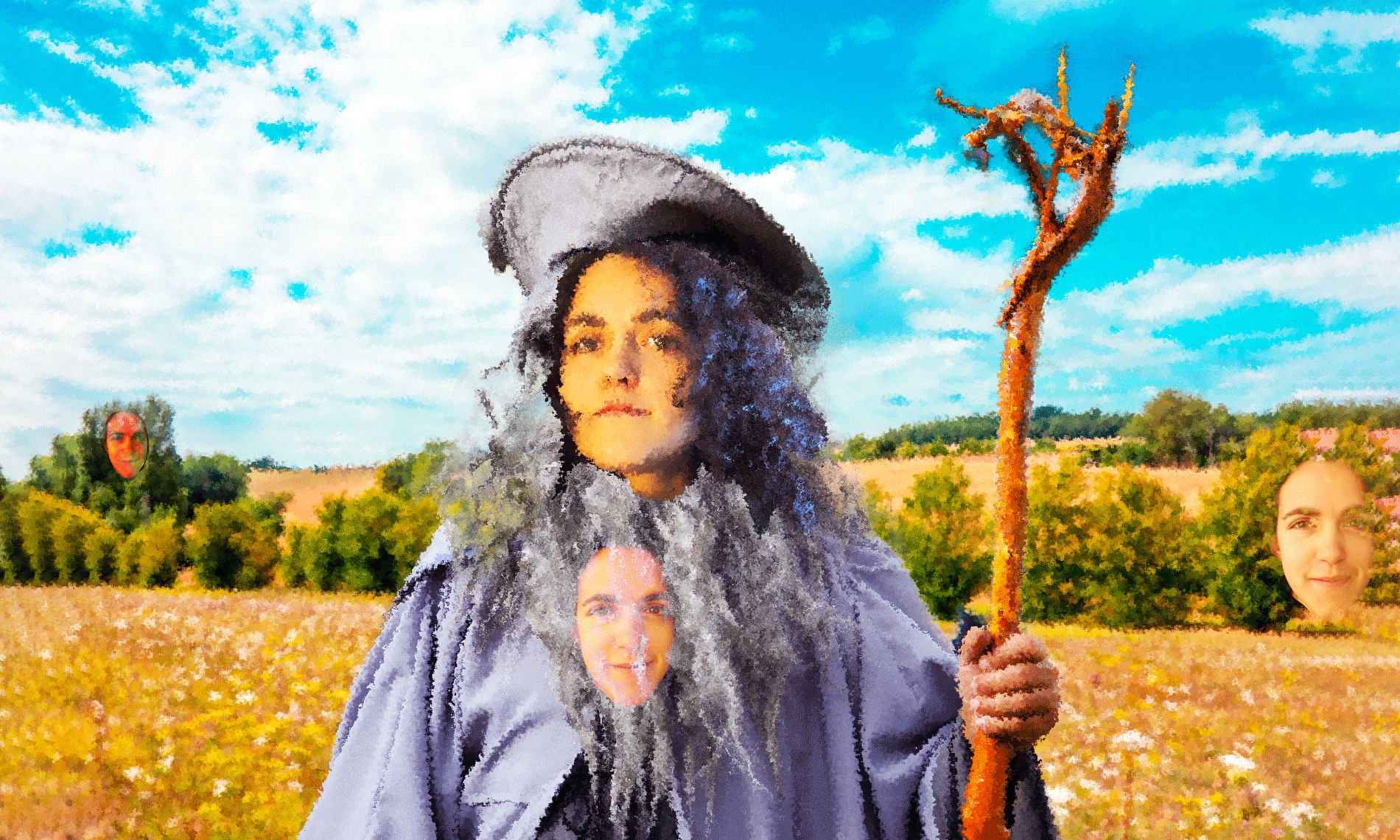
The morning rises on Rue de la Pierre au Diable. The sorcerer is already awake, not because he sleeps little, but because he dreams much, and the dreams draw him from the night with the impatience of a child at the edge of a secret.
In the coming weeks, a young unknown visitor will knock on her door. Silent, almost invisible, he will carry on his shoulders an ancient burden — one that can be lightened only by a gentle look and well-placed words. The poet will not ask questions; he will serve tea, and words will flow by themselves, as they always do in his presence.
Soon, a forgotten project will resurface. A notebook, old, covered with dust, lost between the pages of an Aztec grimoire or perhaps in the folds of time. This book contains the outline of a universal tale, a metaphysical legend that he never finished, but which the world seems to urgently need. He will go back to it, with the quiet ardor of those who know that they never write alone, but always accompanied by old voices and benevolent spirits.
Strange synchronicities will follow — letters found, shared dreams, songs heard in the wind. He will understand that one cycle closes and another opens. He will draw again, but this time, not to illustrate, but to reveal. His features, trembling sometimes, will be more powerful than ever.
Do not listen to anyone’s advice, except that of the passing wind telling you the history of the world.
He will then appear in an unexpected circle — perhaps a university, perhaps a lost festival at the bottom of a valley — where he will speak not as a lecturer but as a crackling fire. Those who listen to him will have the impression that he speaks to each of them, alone, bringing them back to their own essence.
He will know that it is still a mission. Not the last, but one of the beautiful. And in the intimacy of his evenings, between the smell of wood and the crackling of the lamp, he will smile softly as he whispers: “Believe without believing…”
And the world, imperceptibly, will be a little better.

Imagine the initial scene??
The visitor of the equinox
It was a day of equinoxes, when light and shadow balance without effort. The mist was still gliding through the stones of the alley, wrapping the sorcerer’s house like a veil of remembrance. He knew that a visitor would come. He felt it, for several nights already, in the fold of a recurring dream.
He opened the door before anyone even knocked.
 A young man was standing there. Twenty-five years old perhaps. Dark circles around his eyes, a crumpled notebook in an overfilled pocket.
A young man was standing there. Twenty-five years old perhaps. Dark circles around his eyes, a crumpled notebook in an overfilled pocket.
He said nothing, but his shoulders spoke: they carried the weight of a silence inherited.
—Come in, says the poet.
The inside smelled of wood, ink, some sage. On the walls, hanging drawings like incantations. The fire danced softly in the fireplace, and the tea was already waiting, in a green teapot split at the neck.
—You write? asked the sorcerer, pouring two cups.
The young man nodded. Then he muttered:
—I’m trying. But I feel like I lost the story before it even started.
The poet looked at him for a long time, with that patience that only those possess who have crossed the storms of the soul and came out with flowers between their fingers.
—Stories don’t get lost. They wait to be heard.
He took an old book, bound in worn leather. He opened it to a page marked by a dried-out petal. A Mesoamerican legend, woven of solar metaphors, fallen gods and cosmic redemption. He read it in low voice. The words vibrated like strings pinched in the lounge air.
And as he read, the visitor’s shoulders lightened. He took his notebook. He did not copy. He noted what came. It was something else. His own story. Or that of his ancestors. Or both.
The poet smiles. He had not taught anything. He had only opened a door. The rest would be done alone. Or not. But it didn’t matter.
For on that day he was still what he is: a passer between worlds, a weaver of invisible bonds, an ordinary man with luminous powers, connected to the Source.
“Jesus said, be passers-by.”

One evening came when they gathered, those who accompanied him in dream or flesh, visitors of a time or great times.
We are all visitors of this time, of this place. We just walk through them. Our purpose here is to observe, learn, grow, love… after which we go home.
We are all visitors of this time, of this place. We are only crossing them. Our goal here is to observe, to learn, to grow, to love … After which we go home.
The Wolf’s Share
He knew. Not by reading, nor by learning. But because the equinox wind had whispered his name in bark and star language. He was of the clan of the Wolf. Not of those that one tells in the myths tamed, but of the first ones. The Celts before the Celts. Those who spoke with stones and walked with the sky under their feet. Those whose bodies danced the language of the Earth, and whose songs made dawn rise.
One evening, in his house of the Devil’s Stone — a stone which had of the devil but a name given by oblivion — he lit a fire without wood. A memory fire.
They came around him. Not by invitation, but by call. They wore no uniform, no visible name. But everyone had in their eyes the mark of the wolf: that soft and wild brightness, where we read the forest, night and fidelity. The poet did not speak for long. He drew three symbols in the ashes:
A spiral — for the Breath.
A footprint — for the Flesh.
An inverted star — not for evil,
But to remind us that what is above is also in us.
 — Here, he says, is what I give you: not a doctrine, but a fire. Not a truth, but a path. Not laws, but a song.
— Here, he says, is what I give you: not a doctrine, but a fire. Not a truth, but a path. Not laws, but a song.
And he gave them each a fragment of the book. Not copies. Pages torn with love. Each one had a unique phrase, coming from this music that only the Obsidian inkwell could write.
“There is no need to follow the wolf. Be the wind that guides it.”
“He who howls alone learns to listen to the pack.”
“Do not envy the strength of the wolf; cultivate the peace of the wind that carries it.”
“The wind carries the cry of the lonely, and the earth carries the pack.”
A young woman read her sentence out loud: …
An old man whispered his own: …
And all understood that the fragments, when gathered, would never form a visible whole. For the knowledge of the clan does not assemble itself. It disperses. Like seeds in the wind, it sows in ready souls.
And the poet, that evening, felt neither master nor guide. He was one of them. He had kept the fire a little longer. Just enough to pass it on.
Only the fireborn understand blue
Custodian of a Page
Noémie had received the page of the notebook with a mixture of humility and evidence. She did not read aloud that night. She preferred to keep the words in her, as one keeps a seed in the dark of a pot of earth, away from noise.
On her page was written: “You are not following the path; it is the path that awaits your step.“
She knew that this fragment was not a poem: it was a mission. In the days that followed, Noémie felt the call. It was not a cry, nor an emergency; it was an ancient tremor, as if the earth under his feet had recognized the mark of his lineage. She left.
The poet, without asking a question, handed him a small talisman: a black pebble, engraved with a wolf and a circle. He kissed her on the forehead, not as a farewell, but as a blessing. She was his companion, not to hold him, but to go where he could no longer go.
She walked further, towards the land of water and menhirs lying down. And there, in a clearing hidden between two hills with female curves, she felt a presence. The Ancients were there. Not in flesh, but in rhythm. Their breath in the wind, their steps in the grass that folded, their songs in the silence of birds.
She closed her eyes.

From heart to heart
A vision passed through it — not as an image, but as a memory. Women in a circle. Guttural and fluid songs. Runes written on the water. And she, there, at the edge, holding a drum of bark skin.
She knew.
She had not come to learn, but to remember. She was one of the wolves, one of the sisters watching over the fire. And the Ancients, in a whisper of leaves, told him these words: “Tell him that the pack is watching. Let the song circulate. Let the seed germinate. He can write again.”
She returned to the poet after seven nights. He saw her and did not speak. He looked at her, and that look said: “I knew.”
So he opened the book again. He dipped his feather in the obsidian inkwell. And with Noémie by his side, he wrote again. Not for the world.
But for eternity that passes from heart to heart.

Soul Library
- Indian Summer
- The Multicolored Cow
- Jung And The Soul
- Jung And The Divine Madness
- Einstein’s Faith
- The Last Words Of Krishnamurti
- The Will of Baltimore
- The Morning Of The Magicians
- The Light of Mandela
- The Inner Gold
- Tribute to Lao Surlam
- Ten Blue Tigers
- Koans
- Deserting Hatred
- Eternally



